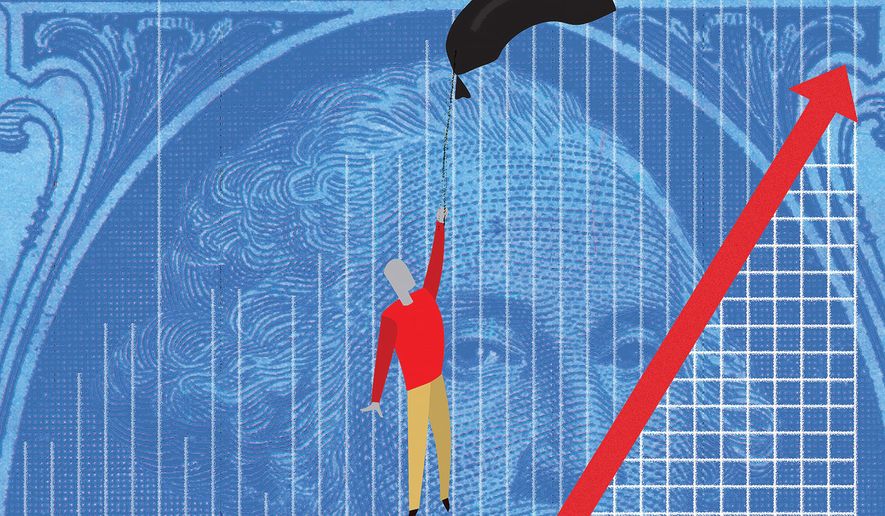OPINION:
Americans should gird for a long, tough battle with inflation.
Paul Volcker is fondly remembered as the Federal Reserve chair who slew double-digit inflation in the early 1980s. Often forgotten is that for 10 years, through prosperity and recession, the annual rate of increase in the consumer price index averaged about 4%.
For the decade between the Global Financial Crisis and COVID-19, the pace was a bit less than 2%. But that was a historic anomaly driven by more-intense globalization, the buildout of Chinese manufacturing and competition forcing businesses to minimize costs through economies of scale and wage arbitrage.
Problems with over-optimization have been laid bare by the semiconductor industry. Fires in two factories — in Japan and Germany — would have caused a global chip shortage even without a pandemic.
China’s mishandling of COVID-19 is causing shortfalls in production from low-tech manufacturers in Vietnam who rely on components from the Middle Kingdom to behemoths like Apple and Toyota.
The Shanghai COVID-19 lockdown makes apparent the vulnerabilities inherent in the heavy reliance of supply chains on China, but it did not create them.
More pandemics are almost certain, and it’s clear we have over-globalized — at least as it concerns dependence on a Communist Party dictatorship that is paranoid about western influence.
Sinopharm is an inferior vaccine, but it will be a rainy day in hell before Beijing puts the health of its citizens first and asks the West for large quantities of Pfizer and Moderna vaccines. And it would rather cast its population into isolationist purgatory than admit to the folly of its Shanghai policy.
Treasury Secretary Janet Yellen calls the great globalization rethink friend shoring.
Apparel retailers like GAP buy more from Central America. The U.S. government seeks to diversify sources of lithium, rare earth minerals, medical supplies, semiconductors and several other products away from China and Taiwan.
All of this will make America more secure, but is terribly costly and will stoke inflation.
Climate change is raising temperatures and causing droughts and floods in the western United States and around the globe. These cause shortages of affordable grains, vegetables, dairy and cooking oils.
The disruptions caused by the Russian invasion of Ukraine, sanctions, and resulting export embargoes in India for wheat and Indonesia for palm oil heightened the adverse consequences of rising global temperatures but hardly created them.
NATO’s policy of avoiding direct confrontation with Russian and limiting weapons and intelligence supplied Ukraine prolongs the war — perhaps to a stalemate — making crisis prices in petroleum and food markets increasingly permanent.
The private sector is moving out of fossil fuels as quickly as emerging battery technology and scarce and vulnerable supplies of lithium and other critical materials will permit. However, Biden administration policies that limit U.S. petroleum producers’ access to leases needlessly raise gasoline and natural gas prices and stoke inflation.
A more sensible approach would encourage solar and wind power, and electrification of transportation and buildings while still enabling U.S. oil and gas supplies.
Saudi Arabian Crown Prince Mohammed bin Salman and Russian President Vladimir Putin are both ruthless autocrats. U.S. energy policies senselessly make difficult and more expensive diversification of European and American sourcing away from Russia, Saudi Arabia and other unfriendly states.
President Biden’s refusal to engage the U.K. and EU in genuine free trade negotiations and reenter the Trans-Pacific Partnership weakens our staunchest and most effective allies. It drives Asian nations to question the durability of the U.S. commitment to counter Chinese expansionism and limits commerce and supply chain investments that would optimize friend shoring.
Domestically, higher interest rates may slow but will hardly break the secular rise in housing prices and rents. It is driven too much by restrictive zoning for land close to cities, work-from-home and the resulting demand for more residential space, and the crime wave begotten by defunding the police and prosecutors who won’t indict looters and even violent criminals.
Yes, Virginia, soft on crime is inflationary.
The pandemic inspired U.S. and European governments to overspend and print too much money. Witness the nearly $3 trillion in additional post-pandemic bank deposits and cash held by U.S. households and nonprofits that keep consumers spending even as interest rates rise.
Rearming the West to counter Chinese and Russian expansionism must be paid for by higher taxes, less spending on social programs or bigger budget deficits enabled by central banks printing more money.
My bet is on more money, more demand and more inflation.
But our Federal Reserve chair tells us the money supply does not matter. He’s aiming for a soft landing when 11 of the 14 tightening cycles since World War II were followed by recessions. His words don’t inspire confidence.
We are likely looking at 4% rather than 2% inflation over the next decade.
• Peter Morici is an economist, emeritus business professor at the University of Maryland, and national columnist.




Please read our comment policy before commenting.